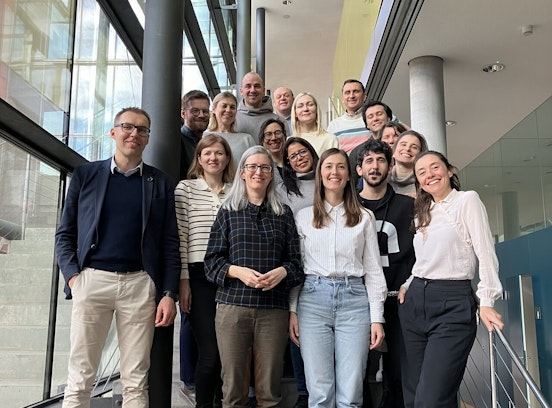ECLECTIC
EU DUT ECLECTIC: Enabling circular economy action plans for small and medium-sized cities
- Deutsch
- English
- Italiano
- Project duration: -
- Project status: ongoing
- Funding: Other EU Funding (EU funding / Project)
- Institute: Institute for Renewable Energy
ECLECTIC aims to enable the design, implementation, and monitoring of circular economy action plans that contribute effectively to climate-neutral, sustainable, and just transitions for small and medium-sized EU cities.
Circular economy and cities
Cities concentrate high density socio-economic activities: they consume lots of resources, produce greenhouse gas emissions, and generate waste of resources, energy, and water. Yet, it is in cities that the greatest economic, cultural, and innovative activities take place. For this reason, cities offer unique opportunities to experiment circular economy models that reduce human impact.
Circular economy in cities means that products, services, infrastructure, buildings, and vehicles are designed and operated to be durable, modular, locally sourced, and easy to maintain and repurpose. Everything can be reduced, reused, remanufactured, or recycled. The result is a local economy that minimizes waste and pollution, extends product lifetime, operates public services more efficiently and regenerates local ecosystems.
The transition from linear to circular economy models in cities is complex. Although many cities across the EU have recently launched circular economy initiatives and plans, they need robust tools to bring knowledge and scientific evidence into action.
Objectives
The main objective of ECLECTIC is to support local stakeholders to design, implement and monitor circular economy action plans that can shift cities from linear to circular models.
During the project, ECLECTIC will involve local authorities and municipalities, businesses, and civil society to understand cities as interconnected network of systems where materials and products can move around in new ways.
To this end, the project will:
- Model cities in terms of resource flows and stocks, and life-cycle environmental impacts through an impact assessment framework.
- Setup four city-region living labs (CiRLabs) to identify together with stakeholders their needs and visions, and co-select circular economy strategies.
- Monitor circular economy action plans in line with cities climate plans and strategies through KPIs.
- Reduce inequality in selecting circular models by developing just and inclusive circular economy strategies.
CiRLabs: city-region living labs
The city-region living labs (CiRLabs) are hubs of discussion and co-creation with local stakeholders where to identify together opportunities, drivers, barriers and enablers for sustainable, just and inclusive circular economy action plans.
ECLECTIC Toolkit
The toolkit will be a user-friendly document summarizing the recommendations, metrics, best practices, lesson learned and educational materials, to inspire action and replication towards circular city-regions. The toolkit will collect the following materials:
- Handbook on policy recommendations for city-regions
- Portfolio of 20+ circular economy solutions
- Design principles for just and inclusive circular economy action plans
- Guidelines for business engagement process
- Guidelines for monitoring circular economy action plans
This project has been funded by Formas, FCT, LMT and MUR under the Driving Urban Transitions Partnership, which has been co-funded by the European Union.











